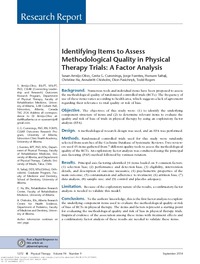Mostrar el registro sencillo de la publicación
Identifying items to assess methodological quality in physical therapy trials: A factor analysis
| dc.contributor.author | Armijo-Olivo, Susan | |
| dc.contributor.author | Cummings, Greta G. | |
| dc.contributor.author | Fuentes-Contreras, Jorge | |
| dc.contributor.author | Saltaji, Humam | |
| dc.contributor.author | Ha, Christine | |
| dc.contributor.author | Chisholm, Annabritt | |
| dc.contributor.author | Pasichnyk, Dion | |
| dc.contributor.author | Rogers, Todd | |
| dc.date.accessioned | 2017-11-10T12:43:34Z | |
| dc.date.available | 2017-11-10T12:43:34Z | |
| dc.date.issued | 2014 | |
| dc.identifier.uri | http://repositorio.ucm.cl/handle/ucm/1168 | |
| dc.description.abstract | Background. Numerous tools and individual items have been proposed to assess the methodological quality of randomized controlled trials (RCTs). The frequency of use of these items varies according to health area, which suggests a lack of agreement regarding their relevance to trial quality or risk of bias. Objective. The objectives of this study were: (1) to identify the underlying component structure of items and (2) to determine relevant items to evaluate the quality and risk of bias of trials in physical therapy by using an exploratory factor analysis (EFA). Design. A methodological research design was used, and an EFA was performed. Methods. Randomized controlled trials used for this study were randomly selected from searches of the Cochrane Database of Systematic Reviews. Two reviewers used 45 items gathered from 7 different quality tools to assess the methodological quality of the RCTs. An exploratory factor analysis was conducted using the principal axis factoring (PAF) method followed by varimax rotation. Results. Principal axis factoring identified 34 items loaded on 9 common factors: (1) selection bias; (2) performance and detection bias; (3) eligibility, intervention details, and description of outcome measures; (4) psychometric properties of the main outcome; (5) contamination and adherence to treatment; (6) attrition bias; (7) data analysis; (8) sample size; and (9) control and placebo adequacy. Limitation. Because of the exploratory nature of the results, a confirmatory factor analysis is needed to validate this model. Conclusions. To the authors’ knowledge, this is the first factor analysis to explore the underlying component items used to evaluate the methodological quality or risk of bias of RCTs in physical therapy. The items and factors represent a starting point for evaluating the methodological quality and risk of bias in physical therapy trials. Empirical evidence of the association among these items with treatment effects and a confirmatory factor analysis of these results are needed to validate these items. | es_CL |
| dc.language.iso | en | es_CL |
| dc.rights | Atribución-NoComercial-SinDerivadas 3.0 Chile | * |
| dc.rights.uri | http://creativecommons.org/licenses/by-nc-nd/3.0/cl/ | * |
| dc.source | Physical Therapy, 94(9), 1272-1284 | es_CL |
| dc.title | Identifying items to assess methodological quality in physical therapy trials: A factor analysis | es_CL |
| dc.type | Article | es_CL |
| dc.ucm.facultad | Facultad de Ciencias de la Salud | es_CL |
| dc.ucm.indexacion | Scopus | es_CL |
| dc.ucm.indexacion | Isi | es_CL |
| dc.ucm.doi | doi.org/10.2522/ptj.20130464 | es_CL |



